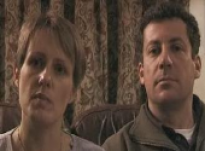Interview 12- Immunisation

Brief Outline:
For DTaP/IPV/Hib - Followed recommendations of health professionals for their son. For MMR and immunisations for their daughter - Conducted an extensive review of the literature and scientific studies using the Internet and talked to their GP and health visitor.
Background:
At time of interview: married, two children, aged 4.5 years (son) and 2 years (daughter). Both children are lactose intolerant. Parents' occupations: Mother- Accountant, Father- Home Dad. Ethnic background: White British.
For more clips from this interview click here.
More about me...
Her GP's practice is supportive and open-minded but she came to realise that through doing their own research they knew more about their son's lactose intolerance and needed to take responsibility for decisions about his care.
Her GP's practice is supportive and open-minded but she came to realise that through doing their own research they knew more about their son's lactose intolerance and needed to take responsibility for decisions about his care.
SHOW TEXT VERSION
PRINT TRANSCRIPT
We have a very supportive surgery. The nurse there was very happy to talk to us. I think there is, I suspect the GPs feel that there isn't any case to answer and that MMR is safe and for many children it probably is. But they were open-minded, they were happy to talk to us, and we have had absolutely no pressure at all from them to vaccinate any further. They understood our concerns, they understood our reasoning for the decisions we took, and have, if not, I wouldn't go so far to say that they've been supportive, but have been understanding.
But many times we had done far more research. And at the end of the day a GP is a general practitioner, they can't be expected to be experts in every field. But what frustrates me is when you get to see somebody who is sometimes an expert in a particular field and they are still very reluctant to acknowledge bowel damage, that lactose intolerance truly exists and that both children had had it from birth, which we are led to believe is very unusual.
So there was a, you know, we felt quite rebutted a number of times. But in many ways it, it worked well for us because it gave us a natural scepticism about I guess the medical profession. And so that's what drove us to then do our own research and do the amount of research we did. Whereas, you know, maybe if people had just said, “Oh, yes, you're right” or, “you need to do this” we wouldn't have actually been driven. But because we were being, I guess people just didn't know that much or, you know, if they did, they didn't have the depth of information that we actually felt we had to do ourselves. It was up to us to make that choice for our children, it was up to us to do that research. So that's the path we led.

